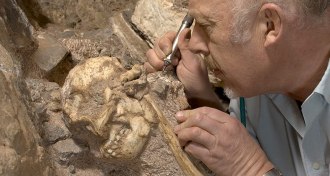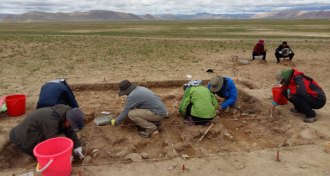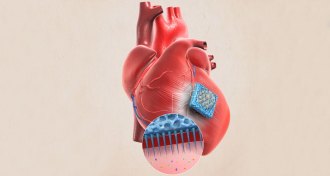Humans
Sign up for our newsletter
We summarize the week's scientific breakthroughs every Thursday.
-
 Humans
Humans‘Little Foot’ skeleton analysis reignites debate over the hominid’s species
Long-awaited analyses of the Little Foot skeleton have researchers disagreeing over resurrecting a defunct species name.
By Bruce Bower -
 Health & Medicine
Health & MedicineA gut-brain link for Parkinson’s gets a closer look
Early evidence suggests that Parkinson’s may be a gut disease that affects the brain.
By Laura Beil -
 Health & Medicine
Health & MedicineTwo new books explore the science and history of the 1918 flu pandemic
One-hundred years after the Spanish flu, ‘Pandemic 1918’ and ‘Influenza’ provide a new look at the global outbreak.
-
 Genetics
GeneticsA 5,000-year-old mass grave harbors the oldest plague bacteria ever found
DNA from an ancient strain of the plague-causing bacterium could help uncover the origins of the deadly disease.
By Bruce Bower -
 Health & Medicine
Health & MedicineBaboons survive 6 months after getting a pig heart transplant
A team of German scientists used new methods to successfully transplant genetically modified and fully functioning pig hearts into baboons.
-
 Science & Society
Science & SocietySeeking a panacea in the gut’s microbiome
Editor in Chief Nancy Shute discusses the potential role of the gut microbiome in Parkinson's disease and one reporter's connection to the story.
By Nancy Shute -
 Health & Medicine
Health & MedicineIn a first, a woman with a uterus transplanted from a deceased donor gives birth
After receiving a uterus from a deceased donor, a woman gave birth to a healthy girl in December of 2017.
-
 Archaeology
ArchaeologyStone Age people conquered the Tibetan Plateau’s thin air
Stone tools that are at least 30,000 years old suggest that people settled the high-altitude Tibetan Plateau earlier than scientists thought.
By Bruce Bower -
 Health & Medicine
Health & MedicineAround the world, reported measles cases jumped 31 percent in 2017
While the number of reported measles cases has dropped 80 percent from 2000 to 2017, high profile outbreaks pushed the 2017 total up from 2016.
-
 Archaeology
ArchaeologyStone-tool makers reached North Africa and Arabia surprisingly early
Ancient Homo species spread advances in toolmaking far beyond East Africa.
By Bruce Bower -
 Health & Medicine
Health & MedicineKids born in August are diagnosed with ADHD more than kids born in September
August-born kids have higher rates of ADHD diagnosis than kids born in September in U.S. states with a September 1 cutoff for starting kindergarten.
-
 Health & Medicine
Health & MedicineA patch studded with tiny needles may help heart attack survivors recover
A bandage that sticks to the surface of the heart exudes proteins and other molecules that help muscle cells grow.